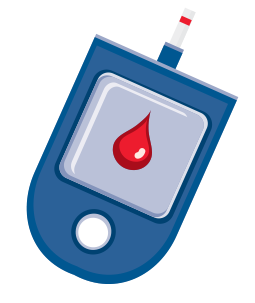How to Help a Loved One With Diabetes When You Live Far Apart
Download this page as [PDF – 2 MB]

Offer your support
Managing diabetes is not easy, whether a person has just been diagnosed or has been living with diabetes for many years. Family support can help a person with diabetes manage everyday tasks and deal with changes in care over time.
But if you live far away from your loved one with diabetes, you may worry about how you can help. Being prepared with the right information can help you provide support, even from a distance. This short guide offers tips that can help.

Learning about diabetes can help you understand what your family member is going through, find ways to help them prevent emergencies, and manage their health care. It can also make talking with your family member’s doctor easier. Here are some tips:
- Learn as much as you can about your loved one’s diabetes medicines, supplies, and equipment, including their blood sugar monitor and test strips.
- Go to Living with Diabetes to learn more about managing diabetes. See Resources for Everyone section for other ideas.
- Ask your loved one to teach you about how they are managing their diabetes and what kinds of support they may need. For example:
- Do they just need someone to check on them now and then?
- Do they need someone to take them to appointments or help make medical and financial decisions?
- Remember—it’s their health, so it’s up to them how much they want to share with you. Let them know that you’re there to support them if they need you.
Gather important information about your loved one’s health care, and keep it up to date. Put it in a place that is easy for your loved one or a caregiver to find. Keep copies for yourself. Here are the kinds of information you should collect:
You can use the Important Contacts and Medical Information form [PDF – 2 MB] to collect this information.
- With your loved one’s consent, make sure that at least one family member or close friend gets written permission to receive medical and financial information from the doctor or hospital. Choose one person to talk with all health care providers, if possible.
- Write down the following medical information:
- Names and phone numbers of your loved one’s care team.
- Names and doses of your loved one’s medicines.
- Names and phone numbers of emergency contacts.
- Make sure your loved one or a caregiver knows how to contact you (or an emergency contact) in an emergency—but tell them to call 911 first.
- Create a list of resources in your loved one’s community (see the Resources for Everyone section for ideas). This list can include information about:
- Social support: Check with your loved one’s health care provider for support groups, social services, and other resources in the community.
- Financial support: Look for community discount programs for medicines, blood sugar monitors, diabetes education, nutrition assessment, and counseling.
- Practical support: Ask your loved one’s health care providers or diabetes care and education specialist if there is someone who can help them get supplies and learn to use equipment, if needed. Caregivers can also learn to use equipment.
Different kinds of organizations can help with different kinds of resources—like meal planning, diabetes care, diabetes camps for children, housekeeping, or emotional support. Here are some places to go for help:
- Local diabetes groups, senior centers, faith communities, and other community groups that provide support services. Your loved one’s health care provider may have a list of local services. You can also check the Resources for Everyone section for ideas.
- Local pharmacies. Many pharmacies offer individual and group counseling.
- Your loved one’s health insurance company or Medicare. Ask what diabetes education and support services are covered. For example, Medicare Part B covers a wide range of diabetes education and training.
- State health and social services. Look for information on the state government website where your loved one lives. Ask about community programs for children, seniors, and people with disabilities.
- Your loved one may need a referral from a health care provider to get services from some organizations. You can help them work with their doctors to get what they need. Remind your loved one that asking for a referral to a diabetes self-management education and support (DSMES) program might be helpful.
- To find a DSMES program recognized by the American Diabetes Association or accredited by the Association of Diabetes Care & Education Specialists, go to the Find a Diabetes Education Program in Your Area website.

- When you visit your loved one, you may worry that you don’t have enough time to do everything you want to. Talk with your loved one ahead of time about the kind of help they may need. You may feel less stressed if you can focus on a few important errands or chores during your visit.
- Research your company’s leave policies. Some companies allow sick leave to be used to care for a relative.
- Remember that your loved one may need help with things like home cleaning and repairs, shopping, or other tasks that are not directly related to their health.
- Check with your loved one or a caregiver to learn what medical care they may need. This information will help you set clear, realistic goals for your visit. For example:
- Do they need to see specialists, such as a foot doctor (podiatrist) or eye doctor (optometrist or ophthalmologist)?
- Do they need more testing supplies?
- Try to make time to do things that are fun and relaxing with your loved one. Suggest taking a walk together. Offer to play a game of cards or a board game.
From time to time, ask your loved one how they are coping with their diabetes and how you can help. With your loved one’s permission, try to find people in the community—like other family members, friends, or neighbors—who can visit and provide support if needed.
Check in regularly with the people who are providing care to your loved one. Find out how they are coping and how you can help them.
Association of Diabetes Care & Education Specialists
Links to diabetes care and education specialists and educational resources.
American Diabetes Association
Information about diabetes prevention and treatment, nutrition, and weight loss.
Diabetes Care During Emergencies
Resources for people with diabetes who are affected by natural disasters, emergencies, and hazards.
Diabetes Action Network, National Federation of the Blind
Information about companies and organizations that offer products and information for people with diabetes and vision problems.
Joslin Diabetes Center
An online library with information about diabetes care, nutrition, medicines, and exercise.
Learn, Connect, Engage With the Diabetes Online Community
Information on diabetes online communities.
National Family Caregivers Association
Tips and guides for caregivers, a bulletin board for peer support, and lists of resources.